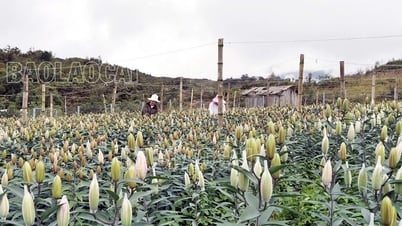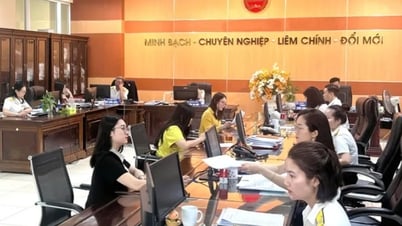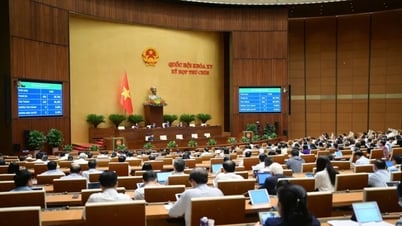>>
>>
Following the issuance of Resolution 68, the Government promptly issued consecutive Resolutions No. 138/NQ-CP and No. 139/NQ-CP; the National Assembly issued Resolution No. 198/2025/QH15 outlining the requirements, tasks, and timelines for the development, completion, and implementation of the policy. At the ongoing 9th Session of the 15th National Assembly, delegates voted to approve a Resolution on some special mechanisms and policies for the development of the private economy.
Clearly, the resolutions of the Politburo , the Government, and the National Assembly have been synchronized and comprehensive, serving as an important driving force and a great encouragement for the business community. The "foundation" has been established, but the current challenge is how to institutionalize these important resolutions into specific, highly feasible mechanisms and policies in practice, thereby inspiring and maximizing the potential of businesses and household enterprises.
Yen Bai currently has nearly 3,500 businesses, including over 2,270 limited liability companies (accounting for 65.79%), 759 joint-stock companies (accounting for 21.96%), nearly 400 private enterprises (accounting for 10.5%), 50 FDI enterprises (accounting for 1.44%), 8 enterprises with 100% state capital managed by the local government (accounting for 0.23%), and 3 enterprises with 100% state capital managed by the central government (accounting for 0.08%).
Every year, the business community contributes over 60% of the total balanced revenue in the province to the state budget. Furthermore, these businesses provide stable employment and income for over 50,000 workers. Despite being a mountainous province located deep inland, lacking significant potential or advantages, the dedication, vision, and support of the local government have enabled many private enterprises to thrive in both scale and technology, gradually establishing national brands and reaching global markets.
These results and achievements are the product of the tireless efforts of the business community and the attention and support of leaders and all levels of government with specific solutions and actions. In particular, the province has promoted the development of all forms of production, business, and supply of goods and services along the market value chain; fostering strong, fair, and transparent development among economic sectors (state-owned enterprises, collective enterprises, foreign-invested enterprises, and private enterprises) to increase added value and expand consumer markets.
Simultaneously, we must build a corporate culture; promote innovation, enhance competitiveness, and access and apply advanced science and technology in production, business, and corporate management. We must develop the labor market, train high-quality human resources, and cultivate a workforce with specialized and in-depth expertise.
Furthermore, Yen Bai has implemented specific policies to support businesses in accessing land, capital, and high-quality human resources; and to assist small and medium-sized enterprises in digital transformation to optimize operations and improve production and business efficiency. In addition, the province maintains the "Weekend with the People and Businesses" movement; the "Businessmen's Coffee" program; and holds meetings and dialogues with businesses and cooperatives to promptly understand and resolve difficulties, creating favorable conditions for attracting investment and developing businesses.
However, the private sector in the province still faces many obstacles hindering its development, failing to achieve breakthroughs in scale and competitiveness. Most micro, small, and medium-sized enterprises (SMEs) are limited in financial resources, management skills, and technological and innovation capabilities; labor productivity, operational efficiency, and competitiveness are not high; business thinking lacks strategic vision, and there is a lack of connection with state-owned enterprises and foreign direct investment enterprises…
Therefore, removing the "bottlenecks" for the private sector to break through in accordance with Resolution 68 becomes a crucial responsibility for local authorities, the business community, especially private enterprises. The province needs to make maximum use of central government policies and mechanisms, while continuing to eliminate inappropriate administrative procedures, minimizing cumbersome and overly formal procedures that hinder and create difficulties for businesses.
Simultaneously, the province needs to continue perfecting a synchronized and consistent mechanism and policy; providing policy information, market information, and administrative procedures support to businesses and business households; creating a favorable and healthy investment and business environment, as well as all conditions for private enterprises to participate in the supply chain. Furthermore, the restructuring of the state apparatus, the establishment of a two-tiered local government model, and the complete shift from a "management government" to a "service government" are opening a new era and expanding the space for the private economy to develop.
Along with attention from the central to local governments, private enterprises themselves need to proactively transform, quickly access information technology to apply it to their businesses, and keep up with new trends; effectively utilize the opportunities brought about by resolutions to build a long-term vision and enhance competitiveness in the context of integration. These solutions are the "key" to removing bottlenecks, unlocking resources, and creating a new impetus for the private sector to "take off" and reach further, aiming for double-digit growth in the era of national development.
The province has consistently focused on administrative reform, improving the investment environment, and supporting and resolving difficulties for businesses, especially simplifying administrative procedures in the fields of investment, construction, resources, environment, land, taxation, and customs. Thanks to outstanding efforts in administrative reform, business support, and improving the investment and business environment and economic management, in 2024 Yen Bai ranked 9th out of 63 provinces and cities in the Satisfaction Index of People and Organizations with the Services of State Administrative Agencies (SIPAS index) and in the Public Administration Reform Index (PAR index). |
Thanh Chi
Source: https://baoyenbai.com.vn/12/351426/Tu-trong-trach-den-co-hoi.aspx






![[Photo] Prime Minister Pham Minh Chinh visits and extends New Year greetings to former Party and State leaders and offers incense to the esteemed predecessors.](https://vphoto.vietnam.vn/thumb/1200x675/vietnam/resource/IMAGE/2026/02/14/1771078465521_dsc-2411-jpg.webp)


































































































Comment (0)